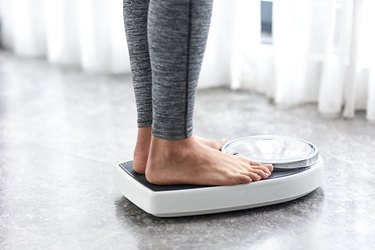
You'll often hear weight-loss experts say that it doesn't matter what time of day you eat, as long as you eat fewer calories than you consume. This isn't wrong: In order to lose weight, you need to consume less energy than you expend.
But research shows that what time of day you eat may have more of an influence on weight maintenance and loss than it's often given credit for. If you want to be a candidate for weight-loss success, eating all your calories before the clock strikes five may be to your advantage.
Video of the Day
Video of the Day
Eat Early and Lose Weight
A study published in the International Journal of Obesity in April 2013 found that people who ate the bulk of their calories earlier in the day lost more weight than those who ate most of their calories later in the day, suggesting that when you eat is, in fact, an important part of weight loss.
The researchers followed 420 overweight adult men and women in Spain, where lunch is the main meal of the day, for a period of 20 weeks. They found that participants who ate their main meal earlier in the day — before 3 p.m. — lost more weight more quickly than participants who ate their main meal after 3 p.m. Researchers concluded that eating later in the day may stall weight-loss success.
Big Breakfasts Play a Role
If you're determined to get in all your calories before 5 p.m., you're going to have to get used to eating a big breakfast. This has benefits of its own, according to a study published in Obesity in December 2013, which found that women that had overweight and obesity who ate the biggest breakfasts — 700 calories — experienced greater weight loss and waist circumference reduction than women who ate the same number of calories in a day but ate a small breakfast of only 200 calories.
Read more: Best Food to Eat in the Morning to Lose Weight
Fitting in Lunch and Dinner
Time will be tight trying to fit in three square meals before you've even left the office, but if you've eaten a large portion of your calories at breakfast, it won't be quite as difficult. If you follow a typical 2,000-calorie diet and can fit in about 800 calories at breakfast, or about 40 percent of your daily intake, then your second and third meals of the day will be slightly smaller and more manageable.
Eating breakfast early — right when you wake up — and waking up earlier if you're a late riser, will also help you fit it all in. Stick to a schedule each day so you don't wind up falling short and either skipping meals or eating in the evening.
Read more: Can You Lose Weight If You Stop Eating After 6 PM?
Things to Consider
To lose weight eating all your calories before 5 p.m., you still need to achieve a calorie deficit. To lose 1 to 2 pounds a week, you have to maintain a daily calorie deficit of 500 to 1,000 calories. That means watching your portion sizes and sticking to healthy whole foods like fruits, vegetables, lean protein, low-fat dairy and whole grains.
Just because you're not eating at night doesn't give you license to pig out on unhealthy foods. You should also plan to fit in 30 to 60 minutes of exercise five days a week to further encourage weight-loss success.